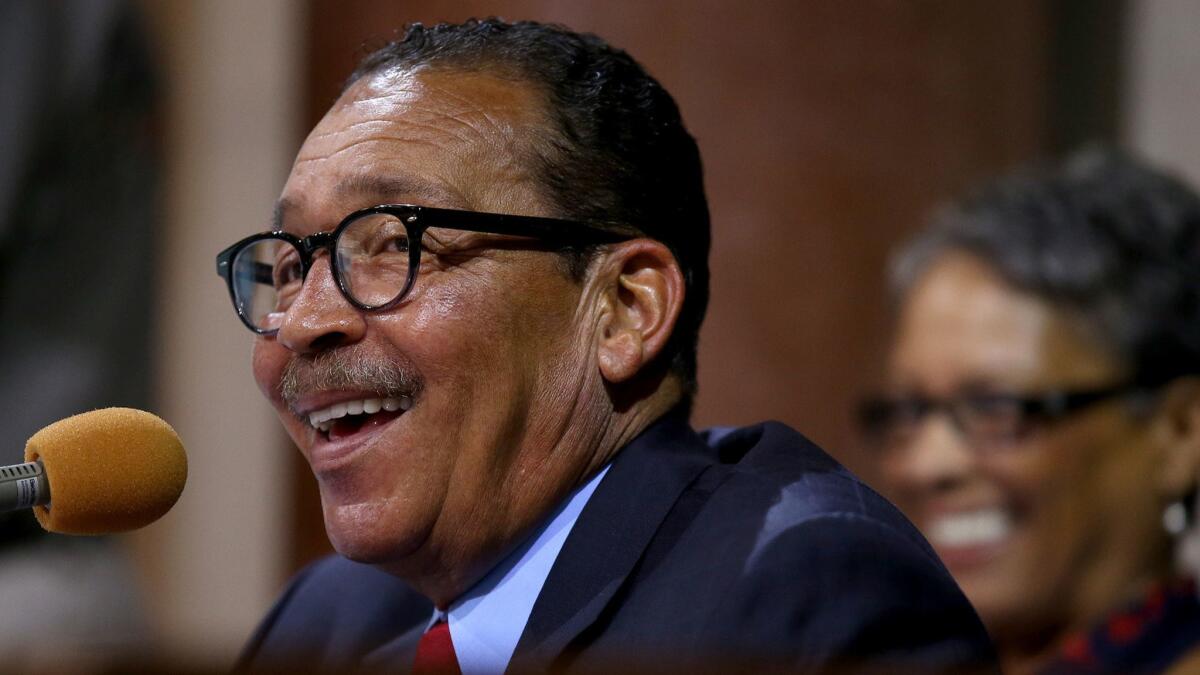Council President Herb Wesson confronted with new financial problems

Los Angeles City Council President Herb Wesson found himself in financial peril two years ago, narrowly avoiding a foreclosure auction on a rental house he owns in Ladera Heights.
Although Wesson ultimately resolved his real estate issues — which included five default notices on his properties in five years — his money woes didn’t go away entirely. Three months ago, Discover Bank secured a $4,529.52 judgment against Wesson and his wife, Fabian Wesson, over unpaid credit card bills.
On Thursday, Wesson issued a brief statement saying the dispute with the company had been resolved.
“A few years ago our family experienced some financial challenges that have since been rectified,” he said in an emailed statement. “This bill has been paid in full.”
Wesson would not answer questions about when the bill was paid — or if payment was made in response to an article in CityWatch, which reported this week on Discover Bank’s lawsuit against the Wessons. The councilman also did not explain why he and his wife failed to respond to the bank’s notifications.
Attorneys with Suttell & Hammer, the law firm representing the bank, did not respond to requests for comment. But in multiple court filings, Discover Bank said the Wessons had $4,195.02 in unpaid bills.
Discover notified the Wessons in writing in April 2017 that it intended to sue over the outstanding bill, saying the most recent payment had been made in July 2016. The bank filed a lawsuit two months later and soon served paperwork at the Wesson residence, according to court documents filed by the company.
The company said it had also incurred $334.50 in costs while seeking payment.
Wesson, 66, earns $200,042 annually, according to the city’s Personnel Department. He is among the most powerful politicians in L.A., setting the agenda of the 15-member council and helping to decide which policies move forward at City Hall.
In an interview with Los Angeles magazine this year, Wesson acknowledged he has a reputation for wielding power over major decisions. “People believe that if you want to make something happen in L.A., you need to go talk to Herb,” he told the magazine. “I’m so fricking proud of that.”
Wesson, who represents neighborhoods stretching from Koreatown to Leimert Park, will be forced off the council in 2020 by term limits. Although some have described him as a future mayoral contender, he is more likely in the short term to run for the seat currently held by Los Angeles County Supervisor Mark Ridley-Thomas, who steps down in 2020.
Wesson’s son, Justin Wesson, has been discussed as a possible candidate for his seat. Asked whether Justin Wesson is interested in such a campaign, a representative of the councilman said the 35-year-old is “focused on today, not tomorrow.”
“Justin Wesson is committed to diligently doing his current job, rather than theorizing about future endeavors,” said Vanessa Rodriguez, a spokeswoman for the council president, in an email last month.
Wesson has faced multiple financial challenges in recent years. In 2011, the year he was elected president by his colleagues, county officials recorded a default notice against his rental property in Ladera Heights, saying he owed $14,746.
The notice was rescinded a few months later. Another default notice arrived in December 2013, saying the Wessons had not paid their mortgage and property taxes on the four-bedroom rental house. Five months later, the county filed notice of an auction.
By then, a separate default notice had been filed on the Wessons’ residence in Mid-City. Both default notices were rescinded in 2014. But in January 2016, the county recorded another default notice on the Mid-City house.
The notice said the Wessons owed $33,248. The Wessons again paid off the balance, and the notice was rescinded.
That same year, the county filed another default notice over the rental house. The property was scheduled for a trustee’s sale in July 2016, which was ultimately canceled, according to county records.
Rodriguez, the Wesson spokeswoman, later said her boss paid off the outstanding bills by tapping personal savings and retirement accounts.
Times staff writer Emily Alpert Reyes contributed to this report.
Twitter: @DavidZahniser
More to Read
Sign up for Essential California
The most important California stories and recommendations in your inbox every morning.
You may occasionally receive promotional content from the Los Angeles Times.











